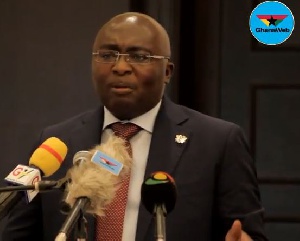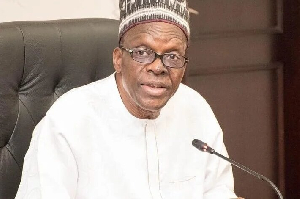Vice President, Dr. Mahamudu Bawumia on Monday announced 10 measures introduced by government agencies, over the past nine months, to improve the country’s ease of doing business.
Vice President Bawumia announced the measures in Accra at a Stakeholders’ Update on Reforms by the Government to Ease Doing Business in Ghana.
The workshop was to engage and create awareness within the private sector, which is ultimately the beneficiary of the ambitious reforms introduced by the Government.
The planned reforms are within the framework of the World Bank Group’s Doing Business Report, which provides objective measures of business regulations for local firms in 190 economies and selected cities at the subnational level.
They would cover starting a business, obtaining construction permits, getting electricity, trading across borders, and resolving insolvency.
The Vice President said those reforms were further demonstration of government’s commitment to removing obstacles that had long kept businesses in Ghana from reaching their full potentials and unleashing the Ghanaian entrepreneurial spirit and open the doors to the world.
Madam Ronke-Amoni Ogunsulire, the Country's Manager for the International Finance Corporation (IFC), said the Doing Business Report had become the global benchmark for measuring how friendly countries were performing in the business environment.
"The ‘zero-sum ranking’ fosters keen competition among countries as those that don’t reform faster than their peers can go down in the ranking even if their business environment does not change. Ghana ranked 114th in the 2019 ranking, up from 120th in 2018,” she said.
“Through our work in advising governments in over 80 countries globally and over 30 in this region, we know that having the commitment at the highest level of leadership is one of the most important ingredients of the reform agenda.”
Madam Ogunsulire, also the IFC's Country Manager for Benin, Burkina Faso, Ghana, Niger, and Togo, said with appropriate reform structures in place, efficient coordination and accountability mechanisms, Ghana had the right formula to succeed and implementing an investment climate conducive to growth of businesses.
Ghana’s reforms, which will take effect between March and June 2019, are; first, for companies applying to register without a TIN number, the TIN number will now be generated automatically online at the point of application.
Second, for the launch of a mobile app and an online platform for the ease of filing tax returns; Individuals will be able to file their taxes online by April 2019.
Third, Ghana would ensure the implementation of an electronic justice system that allows the automated serving of court process with speed and ease.
Fourth, the passage of the companies bill would ensure the removal of the requirement for a commissioner of oaths in registering a company.
Fifth, all four starting-a-business application forms: TIN application, SNNIT application, Business Operating Permit application and Business Registration forms would be merged.
Also the reform would see the automation of the application for Business Operating Permit along with instant online issuance following payment and reduction and automation of the steps to getting electricity.
Last but not the least is the automation of the construction permit system along with instant online issuance following payment; reduction in physical examination of containers through the use of risk engine; and the passing of the Insolvency Bill and the Companies’ Bill into law by Parliament.
Click to view details



Business News of Tuesday, 12 March 2019
Source: ghananewsagency.org

















